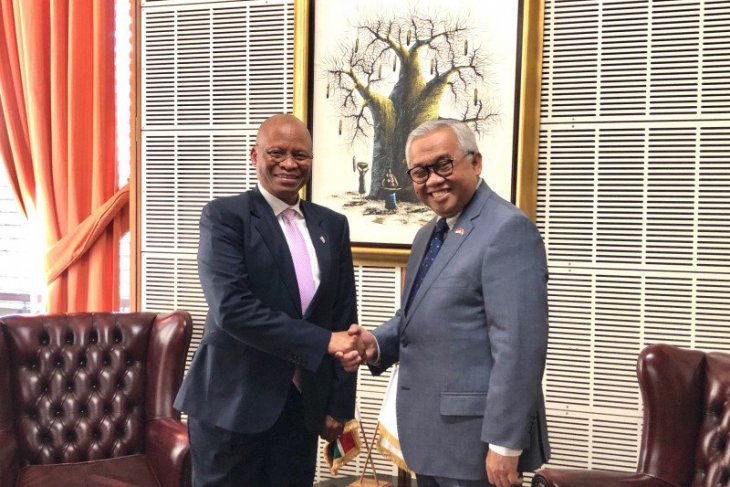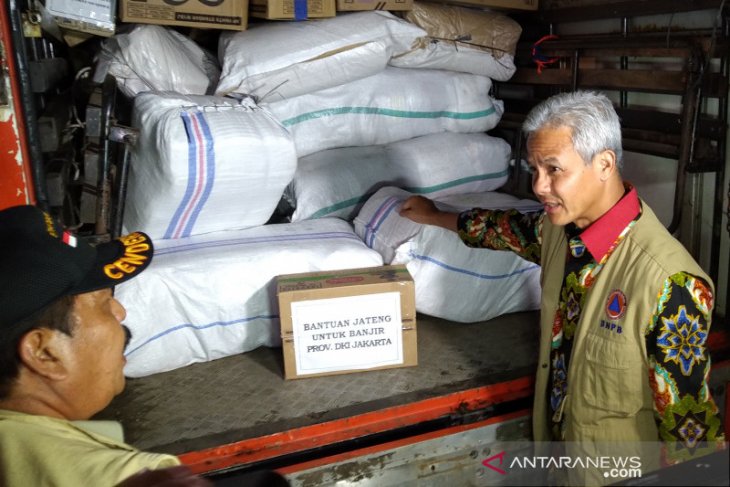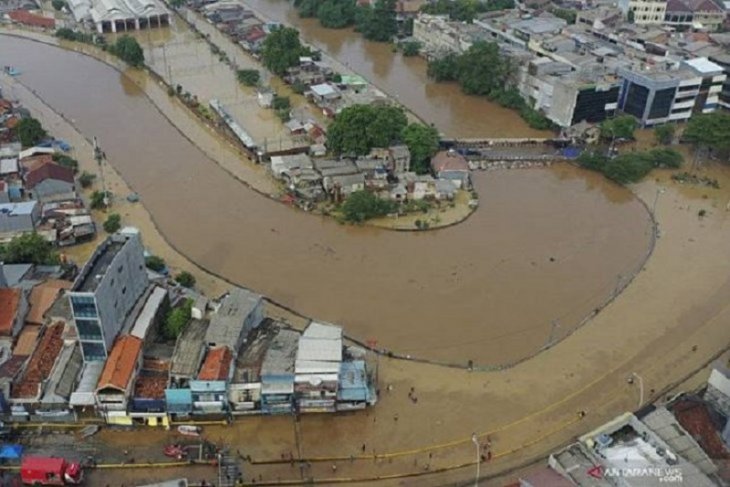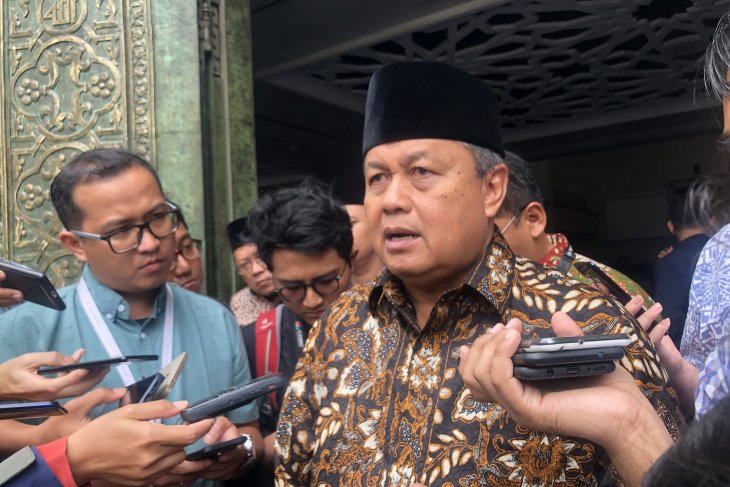Live Streaming
Program Highlight
Company Profile
January
Indonesia to Steadily Boost Economic Relations with South Africa
Written by Ani Hasanah

Indonesian Ambassador to South Africa Salman Al Farisi (on the right). (Indonesian Embassy in Pretoria)
Jakarta - Indonesia will continually strive to intensify economic relations with South Africa in 2020, Indonesian Ambassador to South Africa Salman Al Farisi noted. The ambassador remarked in a statement issued by the Indonesian Embassy in Pretoria and received in Jakarta, Friday.
"The economic condition in South Africa is still quite challenging for us to be able to penetrate the market deeper and bring diverse Indonesian products here. However, in 2019, we got some positive indications, ranging from the commitment of several companies in Indonesia to bring representatives in South Africa, to new investment plans from South African companies to Indonesia," Ambassador Al Farisi stated.
He highlighted that some agreements, such as the Defense Cooperation Agreement and MoU in the Fisheries Sector, had almost reached the final stage.
"We hope that 2020 would bring about more encouraging development," Al Farisi remarked while expressing hope for intensifying relations between the two countries.
Since 2015, trade volume between Indonesia and South Africa had shown a fluctuating trend. However, the Indonesian ambassador was not overly concerned about the trade balance in 2018 that showed a surplus for the South African side.
He pointed out that increased purchases of capital goods from South Africa was a good sign of productive activities in Indonesia, chiefly linked to the need for intensive infrastructure development in recent years.
Moreover, he pointed to Indonesia still holding vast potential to boost its exports, such as of automotive products, palm oil, and food and beverage products, to Sub-Saharan African countries.
Nevertheless, tariff barriers are still viewed as hindering trade relations between Indonesia and South Africa.
Indonesian Coordinating Minister for Maritime Affairs and Investment Luhut B. Pandjaitan -- during his working visit to Cape Town on December 18-19, 2019, -- met Minister of Trade and Industry of South Africa, Ebrahim Patel.
During the meeting, Minister Patel welcomed the preliminary discussion on the Preferential Trade Agreement (PTA) between both nations and expected a concrete step to begin with a study by a technical team in the start of this year.
Moreover, Minister Patel indicated several investment potentials by Indonesian businesspersons, especially the relocation of the textile and footwear industry.
The economic condition of South Africa and the surrounding countries, within the accreditation scope of the Indonesian Embassy in Pretoria, have influenced the Indonesian government’s strategy in its efforts to expand the African market for Indonesian products.
Low spending of the household sector in 2019 has demonstrated that South African consumers are still financially cautious. With the slowing economic growth at around 0.7 percent in 2019, South Africa is facing the problem of unemployment rate of 29.1 percent, thereby making it a country with the highest unemployment rate in the world.
In response to such a condition, Ambassador Al Farisi believes the investment-led model is one of the most suitable mechanisms of cooperation between both nations. He argued that Indonesian businesses must consider investing in African countries that will in turn boost exports.
"Helping to accelerate the local economy through the opening of new jobs will ultimately increase awareness, demand, and purchasing power of the people for Indonesian products," Al Farisi pointed out.
"This can be done by exporting semi-finished products from Indonesia, among others, while the process of finishing products should be done through partnerships with local parties," he added. (ANTARA)
January
Central Java Sends Aid Packages to Banten, Jakarta, West Java
Written by Ani Hasanah
Central Java Governor Ganjar Pranowo (right) (ANTARA)
Semarang, C. Java. - The Central Java provincial government shows sympathy for the victims of flash floods and landslides in Banten, Jakarta, and West Java by sending three trucks loaded with humanitarian aid packages on Friday evening.
The aid packages would be sent to each of the three provinces' disaster mitigation agencies to be then distributed to those in need in the disaster zones, Central Java Governor Ganjar Pranowo said.
Prabowo witnessed the departure of the trucks from the yard of his office on Friday evening, saying that the first batch of this humanitarian aid was a token of brotherhood and care of the people of Central Java to those affected by the deadly catastrophe.
The humanitarian aid packages contain 33 items of such stuff as baby diapers, blankets, bottled water, school uniforms, tents, mattresses, sarongs, and mukenas (head-to-toe prayer gowns) in which each of those items consists of 2,000 pieces, he said.
"There is not much we can send but, Insya Allah (God willing), this is part of our sense of brotherhood, love, care, and solidity among members of one nation. This is also part of our habit of helping one another whenever disasters strike. We help one another," Ganjar Pranowo said.
The Central Java provincial administration also dispatched tens of its personnel and volunteers to help their colleagues in the disaster zones in the three provinces, he added.
Regarding the deadly flash floods and landslides hitting greater Jakarta areas early this year, The People's Consultative Assembly (MPR) Speaker Bambang Soesatyo urged central and regional governments and communities to not engage in a blame game over the catastrophe.
In its place, Soesatyo called on all related parties within the central and regional governments, whose areas were ravaged by the catastrophe over these past three days, to strengthen synergy and cooperation to prevent a relapse of a similar disaster in future.
The flash floods and landslides, ravaging certain areas in Jakarta and several districts and cities in the provinces of West Java and Banten over these past three days, have claimed at least 43 lives and affected 409 thousand others.
Most of the affected people were found in Bekasi City in West Java, the National Disaster Mitigation Agency (BNPB) spokesman, Agus Wibowo, noted in a press statement.
The agency recorded that the catastrophe affected 366,274 residents of Bekasi City, while 20,939 and 13,230 people respectively in Jakarta and Bogor District, West Java, bore the impacts of the floods.
The flash floods and landslides also struck the areas of Lebak District and Tangerang Selatan City in Banten Province as well as those in Bekasi District, Bogor City, Depok City, and Cikarang District in West Java Province, Wibowo remarked.
In helping social workers provide food packs for the flood survivors in Jakarta, state-owned oil and gas company PT Pertamina (Persero) distributed 146 Bright Gas and 12-kilogram gas canisters to handle the demands of 13 public kitchens.
The company's spokesperson, Dewi Sri Utami, had stated earlier that the gas canisters were distributed to the public kitchens on Thursday after those from PT Pertamina's Marketing Operation Region III coordinated with the authorities of BNPB and Jakarta's Social Affairs Office.
A total of 146 gas canisters were handed over to 13 of the 20 public kitchens that the authorities had set up around the capital city to provide food packs to the flood survivors, she remarked, adding that the gas canisters will again be distributed to those in need. (ANTARA)
January
Industrial Area Immune to Impacts of Flooding: HKI
Written by Ani Hasanah
Floods submerged the area of Jalan Jatinegara Barat, Kampung Pulo, Jakarta, Thursday (02/01/2020). (ANTARA)
Jakarta - Indonesia's Association of Industrial Estates (HKI) Chairperson Sanny Iskandar confirmed that industrial estates that are HKI members were safe from the effects of floods that struck Jakarta, Bogor, Depok, Tangerang and Bekasi (Jabodetabek).
"No HKI members have until now reported any impact from flooding on the developed industrial estate," Iskandar remarked when contacted in Jakarta on Friday.
According to the HKI Chairperson, the industrial estate that was well-developed and managed in accordance with the guidelines and technical standards of the area had taken precautionary measures against various events, including flooding, since the start of its construction.
"Yes, this is since the drainage system has been calculated for annual flooding, and the management also has been running well, starting from the development stage," he stated.
Hence, manufacturing activities in the industrial area are relatively unhindered during the floods that hit Jabodetabek.
However, he noted that the employees encountered difficulties to go to the industrial areas.
"The problem is the access from the employee's house to the location of the area. However, we hope that on Monday, matters would return to normal," he remarked.
A total of 31,232 residents of Jakarta were earlier compelled to flee their flooded homes as of Wednesday night, according to the flood command post.
Some 310 of the flood victims were found in Bendungan Hilir, Petamburan, and Karet Tengsin, Central Jakarta. They were provided shelter at two evacuee camps.
In North Jakarta, floods affected 1,515 people in Rorotan, Semper Barat, Semper Timur, Sukapura, Kelapa Gading Timur, and Pegangsaan Dua. They had sought refuge in 23 evacuee camps.
The number of flood evacuees in West Jakarta had reached 10,686 sheltered in 97 evacuee camps. They came from Jelambar, Tomang, Wijaya Kusuma, Srengseng, Semanan, Kalideres, Tegal Alur, Pegadungan, Kota Bambu Selatan, Kedoya Utara, and Sukabumi Selatan.
A total of 13,516 flood evacuees in East Jakarta were sheltered at 99 locations. Kebon Manggis, Kampung Melayu, Bidara Cina, Cipinang Besar Selatan, Klender, Pondok Bambu, Pondok Kelapa, Cawang, Balekembang, Dukuh, and Cipinang Melayu were swamped by the flooding.
In South Jakarta, 5,305 people fled their flooded homes and were accommodated at 48 different locations. The flooding in South Jakarta affected Gunung, Petongan, Pengadengan, Cilandak Timur, Pejaten Timur, and Manggarai Selatan.
In general, the flood evacuees were in dire need of food, clean water, blankets, and tarpaulin.
Governor Anies Bawesdan stated that the Jakarta administration had made concerted efforts to handle flood victims and ensure the safety of people living in flood-affected areas.
"I call on the people living in river basin areas to remain on standby and coordinate with the ranks and files of the Jakarta administration that are ready to help them," he added. (ANTARA)
January
Foreign Capital Flow Reached Rp224.2 Trillion in 2019: BI
Written by Ani Hasanah
Bank Indonesia Governor Perry Warjiyo at the Office of Bank Indonesia, Jakarta, Friday (Jan 3, 2020).(ANTARA)
Jakarta - Bank Indonesia (BI) Governor Perry Warjiyo pointed to the flow of foreign capital of Rp224.2 trillion into Indonesia remaining stable amid the global economic turmoil from the start of January to December 31, 2019.
Warjiyo remarked that the external conditions did not have a significant impact on investments entering Indonesia in accordance with the magnitude of inflow of foreign capital.
"Thank God, we close in 2019, with the achievement of external stability that is maintained with a significant influx of foreign capital at Rp224.2 trillion," Warjiyo remarked in Jakarta on Friday.
Warjiyo detailed most of the flow of foreign capital came into government bonds, or Government Securities (SBN), specifically Rp168.6 trillion, Rp50 trillion stock market, Rp3 trillion corporate bonds, and Rp2.6 trillion Bank Indonesia Certificate (SBI).
Furthermore, he stated that Indonesia's foreign exchange reserves had increased until the fourth quarter of 2019.
Based on the BI data, Indonesia's foreign exchange reserves reached US$127 billion.
Warjiyo stated that this signals an improvement in the balance of payments of Indonesia (NPI) in the fourth quarter of 2019 and a surplus is forecast to occur.
"Our foreign exchange reserves will rise again, thereby indicating that the balance of payments in the fourth quarter will experience a surplus. God willing, we will announce it next week," he stated.
Warjiyo also noted that in 2019, the stability of the rupiah was well-maintained, with the currency experiencing an appreciation of 2.68 percent and closing at Rp13,880 per US dollar.
Meanwhile, the credit default swap (CDS) was maintained at a low level, the rate of growth was only 60.6 basis points, the lowest in the past five years.
"Another indicator maintained is our premium CDS that is 60.6 bps. This is very low and also the lowest in the last five years," he stated.
The Central Statistics Agency (BPS) recorded an inflation rate of 2.72 percent in 2019, as the government was able to maintain the stability of prices, especially of commodities whose administered prices are regulated by the government.
"Prices were relatively controlled, particularly in terms of the administered prices," BPS Head Suhariyanto noted at a press conference in Jakarta on Thursday.
Inflation from administered prices in 2019 was only recorded at 0.51 percent as compared to 3.36 percent in 2018, Suhariyanto stated.
Inflation from government-regulated prices in 2019 was also lower than the core inflation of 3.02 percent and volatile food inflation at 4.3 percent.
"Last year, the gasoline prices had increased that contributed to 0.26-percent inflation and 0.10-percent air freight rates, which no longer contributed to inflation in 2019," he added. (ANTARA)


